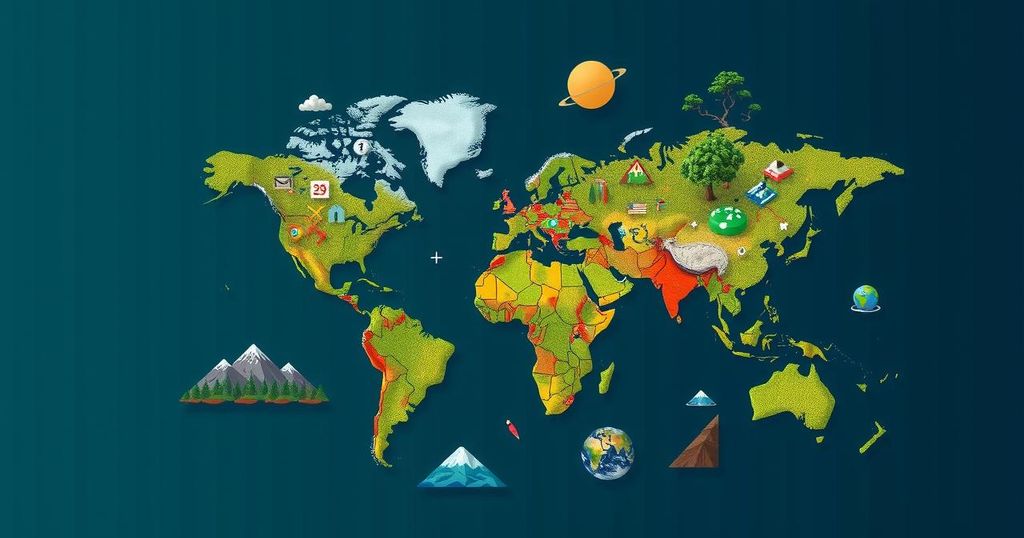World news
AFRICA, ASIA, AZERBAIJAN, BAKU, CLIMATE, CLIMATE CHANGE, DISASTER RELIEF, EX, EXXONMOBIL, GREENPEACE INTERNATIONAL, JAPAN, MEXICO, NATURAL DISASTERS, NORTH AMERICA, OECD, PARIS AGREEMENT, PHILIPPINES, SENEGAL, SHELL, STAMP OUT POVERTY, UN, UN FUND FOR RESPONDING TO LOSS AND, USA
Sofia Rodriguez
0 Comments
Addressing Climate Loss and Damage: The Case for Fossil Fuel Taxation
The COP29 conference debates climate loss and damage financing, highlighting a report suggesting a tax on major oil companies could significantly increase funds for climate response. A Climate Damages Tax could raise around $900 billion by 2030 to support affected communities. Activists are pushing for accountability from fossil fuel companies to address the climate crisis equitably.
At the recent United Nations climate change conference in Baku (COP29), discussions centered around a critical question: who will bear the financial responsibility for climate-related losses and damages? A report from Greenpeace International and Stamp Out Poverty has proposed a solution by introducing a modest tax on the revenues of seven major oil and gas companies. This initiative could potentially increase the UN Fund for Responding to Loss and Damage by over 2000%.
For instance, a tax levied on ExxonMobil’s 2023 extraction could cover a significant portion of the damages caused by Hurricane Beryl, while taxing Shell could address the impacts of Typhoon Carina in the Philippines. Furthermore, taxing TotalEnergies could potentially cover more than thirty times the costs incurred from flooding in Kenya. These proposals underline the connection between fossil fuel extraction and the escalating climate crisis, which disproportionately affects vulnerable communities worldwide.
Advocates are calling for a Climate Damages Tax (CDT) that aligns taxes on fossil fuel extraction with the compensation needs of climate-impacted areas, emphasizing that such measures could raise approximately $900 billion by 2030 for supporting governments and affected communities. This initiative represents a push towards climate justice, advocating for a paradigm shift where the financial burden of climate crises is placed on those who have contributed to the problem rather than on the victims.
A coalition of activists and climate survivors have taken to the streets to raise awareness; their latest action involved delivering remnants of personal tragedies—symbols of loss due to extreme weather events—to the offices of leading oil companies. Abdoulaye Diallo, Co-Head of Greenpeace International’s initiative, asserts the necessity for robust measures to compel fossil fuel companies to pay their share.
Ultimately, the conversation at COP29 exemplifies the urgent need for bold financial strategies to address climate change and its implications, highlighting the intersection of environmental responsibility and financial accountability.
The topic of climate loss and damage financing has garnered significant attention, particularly following extreme weather events linked to climate change. At the COP29 conference, the focus was on developing a consensus regarding climate financing, with specific attention given to how to best hold major polluters financially accountable. Furthermore, studies indicate that a substantial taxation of major oil and gas companies, based on their profits, could significantly bolster the funds available for climate action, ultimately benefiting those most affected by climate disasters.
In conclusion, the ongoing discussions at the COP29 conference emphasize the necessity for a paradigm shift in climate financing, where those who contribute most to the crisis are held accountable. Implementing a Climate Damages Tax could not only provide substantial funding to assist affected communities but also align financial responsibilities with the realities of climate change. By demanding that polluters contribute to rectifying the damages they cause, advocates are calling for meaningful climate justice and sustainable solutions for future environmental challenges.
Original Source: www.ipsnews.net




Post Comment